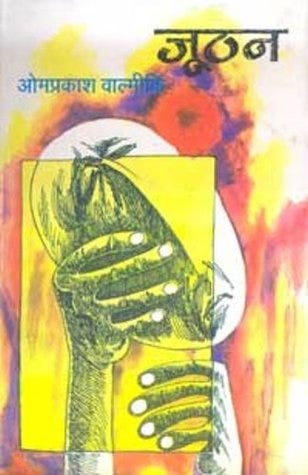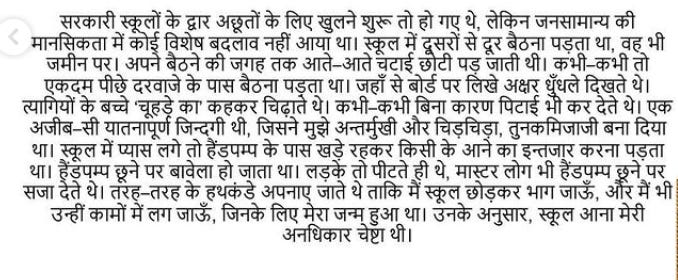While a bubble needs a gentle poke to burst, oblivion is a bubble made of cement. It takes a drilling machine to realize there is one. Joothan, as a book, is a drilling machine.
The deliberate restriction of access to education made capturing Dalit history difficult in the past, but it couldn’t be completely shut down. Oral storytelling through folklores, poetry, songs were used as vehicles to communicate the brute reality. With time, literature also saw the surge of better representation of Dalit writers, who took us closer to real lives and not be confined with a distant gaze. We saw better cultural representation , cognizance of proclivities, challenges in social fabric, political affiliation as well as conversation of discrimination : be it subtle day to day ones or the violent brutalities.
We saw an India that we believe doesn’t exist.
Joothan ( Translation : leftover scraps of food) is one of the most powerful works in this genre. It peels off layers of caste-based atrocities in our country. While the Indian Constitution abolished Untouchability in 1950, reality continues to be a social mirage.
The book is a first hand account by author Om Prakash Valmiki. It speaks about how birth in a caste, defines your identity for the rest of your life. Everyday chores : social mobility, food consumption, education, job become reminders of caste identity. It’s a realization of how unbalanced the scales are.
Joothan covers how seeds of discrimination are palpable from early life in schools. While one expects education to erase bias, the irony of prominent caste bias plays out prominently in schools.
An excerpt from the book :
The narrative moves from school to college across different geographies, but the disturbing homogenous behaviour of caste based oppression stayed consistent, including in metropolises like Mumbai.
With their surnames giving away their caste identity, the only solution some of them resorted to was giving it up.
But Valmiki decided to take matters into his own hands. Throughout his life, his belief on education as a solution was intact. He understood the importance of documented literature to trigger conversation on caste discrimination. Thus, he became part of the solution by sharing a nuanced, sensitive and extremely detailed story of his life.
The narrative is gut-wrenching, but this is what makes it essential to read.
Even if you believe caste based identity doesn’t exist – read it.
Even if you are against affirmative action – read it.
Even if you feel calling someone ‘Bhangi’ for a shabby look is harmless- read it.
Read it with an open mind to introspect. Just because we don’t see something, doesn’t mean it doesn’t exist. Or maybe we aren’t looking hard enough.
( There is an English translation available as well)





